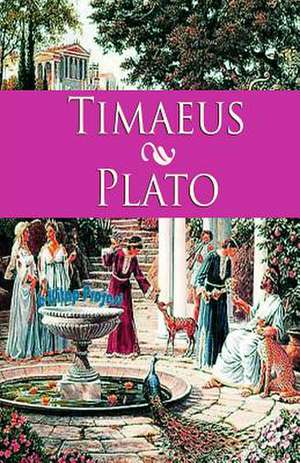Timaeus
Autor Plato Ilustrat de Murat Ukray Traducere de Benjamin Jowetten Limba Engleză Paperback
| Toate formatele și edițiile | Preț | Express |
|---|---|---|
| Paperback (27) | 40.66 lei 3-5 săpt. | |
| CREATESPACE – | 40.66 lei 3-5 săpt. | |
| CREATESPACE – | 43.56 lei 3-5 săpt. | |
| CREATESPACE – | 46.59 lei 3-5 săpt. | |
| CreateSpace Independent Publishing Platform – | 48.05 lei 3-5 săpt. | |
| CreateSpace Independent Publishing Platform – | 54.43 lei 3-5 săpt. | |
| – | 56.42 lei 3-5 săpt. | |
| CreateSpace Independent Publishing Platform – | 73.70 lei 3-5 săpt. | |
| CREATESPACE – | 78.42 lei 3-5 săpt. | |
| – | 91.30 lei 3-5 săpt. | |
| Hackett Publishing Company – 15 mar 2000 | 93.07 lei 3-5 săpt. | +16.27 lei 7-13 zile |
| CREATESPACE – | 93.63 lei 3-5 săpt. | |
| Focus Publishing/R Pullins & Co – mar 2016 | 100.02 lei 3-5 săpt. | +17.96 lei 7-13 zile |
| Outlook Verlag – 31 oct 2022 | 318.15 lei 17-23 zile | +30.67 lei 7-13 zile |
| – | 61.50 lei 6-8 săpt. | |
| Lector House – 7 iul 2019 | 73.80 lei 6-8 săpt. | |
| Serenity Publishers, LLC – 30 sep 2008 | 79.66 lei 6-8 săpt. | |
| Echo Library – 30 sep 2006 | 83.18 lei 38-44 zile | |
| SMK Books – 23 oct 2010 | 87.61 lei 6-8 săpt. | |
| Binker North – 15 iul 2023 | 91.44 lei 6-8 săpt. | |
| BLURB INC – 17 feb 2019 | 92.07 lei 17-23 zile | |
| Akasha Classics – 11 noi 2009 | 92.77 lei 6-8 săpt. | |
| Blurb – 28 oct 2021 | 105.03 lei 6-8 săpt. | |
| Serenity Publishers, LLC – 12 dec 2010 | 107.23 lei 6-8 săpt. | |
| 1st World Publishing – 30 sep 2008 | 112.18 lei 6-8 săpt. | |
| Book Jungle – 17 apr 2008 | 130.45 lei 6-8 săpt. | |
| TREDITION CLASSICS – 31 oct 2011 | 148.02 lei 6-8 săpt. | |
| Blurb – 11 feb 2019 | 185.45 lei 38-44 zile | |
| Hardback (4) | 158.90 lei 6-8 săpt. | |
| 1st World Publishing – 30 sep 2008 | 158.90 lei 6-8 săpt. | |
| Akasha Classics – 11 noi 2009 | 175.11 lei 6-8 săpt. | |
| SMK Books – 3 apr 2018 | 178.16 lei 6-8 săpt. | |
| Blurb – 22 mar 2023 | 220.25 lei 6-8 săpt. |
Preț: 85.73 lei
Nou
Puncte Express: 129
Preț estimativ în valută:
16.41€ • 17.06$ • 13.73£
16.41€ • 17.06$ • 13.73£
Carte indisponibilă temporar
Doresc să fiu notificat când acest titlu va fi disponibil:
Se trimite...
Preluare comenzi: 021 569.72.76
Specificații
ISBN-13: 9781503043299
ISBN-10: 1503043290
Pagini: 252
Dimensiuni: 140 x 216 x 14 mm
Greutate: 0.32 kg
Editura: CREATESPACE
ISBN-10: 1503043290
Pagini: 252
Dimensiuni: 140 x 216 x 14 mm
Greutate: 0.32 kg
Editura: CREATESPACE
Recenzii
Donald Zeyl's fresh and faithful translation and his lucid, comprehensive commentary will bring the sublime Timaeus to life for contemporary students of cosmology, metaphysics, history of science, and philosophy. --Sarah Broadie, Princeton University
Notă biografică
Plato was an ancient Greek philosopher born in Athens during the Classical period in Ancient Greece. In Athens, Plato founded the Academy, a philosophical school where he taught the philosophical doctrines that would later become known as Platonism. Plato (or Platon) was a pen name derived, apparently, from the nickname given to him by his wrestling coach - allegedly a reference to his physical broadness. According to Alexander of Miletus quoted by Diogenes of Sinope his actual name was Aristocles, son of Ariston, of the deme Collytus (Collytus being a district of Athens).Plato was an innovator of the written dialogue and dialectic forms in philosophy. He raised problems for what later became all the major areas of both theoretical philosophy and practical philosophy. His most famous contribution is the Theory of forms, which has been interpreted as advancing a solution to what is now known as the problem of universals. He is also the namesake of Platonic love and the Platonic solids.His own most decisive philosophical influences are usually thought to have been, along with Socrates, the pre-Socratics Pythagoras, Heraclitus, and Parmenides, although few of his predecessors' works remain extant and much of what we know about these figures today derives from Plato himself.[a]Along with his teacher, Socrates, and his student, Aristotle, Plato is a central figure in the history of philosophy.[b] Unlike the work of nearly all of his contemporaries, Plato's entire body of work is believed to have survived intact for over 2,400 years.[6] Although their popularity has fluctuated, Plato's works have consistently been read and studied. Through Neoplatonism Plato also greatly influenced both Christian and Islamic philosophy (through e.g. Al-Farabi). In modern times, Alfred North Whitehead famously said: "the safest general characterization of the European philosophical tradition is that it consists of a series of footnotes to Plato.
